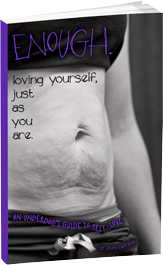Hi. My name is Erin, and I am divorced.
Divorce isn’t all that surprising these days (sad), but the frequency with which it happens does not diminish it of drama.
When I hear people say “I’m divorced, we’re getting divorced,” my gut reaction is to ask (with all the drama of a girly, middle-school-tragedy-queen from Orange County), “Gaassssp…. OMG WHY? What happened? Did he cheat? Did you cheat? Give me the deets!”
We love drama, especially drama that isn’t ours, so today I’ll give you some of mine. (grab some popcorn!)
In the beginning, our relationship was pretty great. We got along. We laughed and enjoyed one another’s company. We liked the same kind of things, spent time with the same kind of people, had the same kind of dreams.
About a year and a half into our marriage, things changed.
Without going into too much gory detail (I won’t do that here, to get that kind of juice you’ll have to call me on the phone), HE changed.
…or, now that I’m older and wiser, it might be better for me to say “He stayed exactly the same, but I finally learned what that was.”
(seriously juicy. call me on the phone.)
Regardless, things changed. He made some choices. I made some choices. Some of my choices were because of his choices, but they were still mine.
We stayed together for eight and a half years after the decline. I can’t speak with authority for his reasons for staying, but I can speak to mine.
I was afraid.
I was afraid that I would upset other people. I was afraid that other people would think badly of me, because I had quit. I was afraid I would ruin my kids, that I’d have to save for therapy instead of college, and that his family would hate me forever.
As it was, some of those things happened, but not all. Most were prevented. Some things happened that I didn’t even expect, and those things sucked the most.
At the time, as I was going through it, I can say without any doubt that my divorce was the hardest, ugliest, snot-bubbliest time of my whole life. I cried. A LOT. I cried making breakfast, buying groceries, folding laundry, while I worked. My keyboard was cleaned with tears every day. I lost a lot of weight. (insert totally inappropes joke about anorexics here.) I lost my best friend. I lost some of my family. I lost ALL of his family. I lost my home, acquaintances, support groups, my Bible study, and (what felt like) 16 years of my life.
Slowly, slowly, things got better.
It’s been almost seven years since my marriage fell apart.
I’ve healed. He’s healed. We’re both better people.
Since then, since the decline and fall of my marriage, I’ve done a lot of thinking. I’ve thought about where we went wrong. I’ve thought about what I could have done better, and (even though I’m positive that the lion’s share of responsibility for our divorce lies on his shoulders, and he would agree) I wonder how much of it was my fault. I wonder what I could have done differently, and how this next time (if there ever is one) needs to be different.
As a recoverING perfectionist I’m better about accepting my mistakes, but I really don’t like making the same mistake twice.
Marriage-that-ended-in-divorce was a BIG mistake, and I forfucksure don’t want to do it again, so I think. I think and talk and ask questions.
“Exit Interview,” they call it.
A few years ago, as I shopped at the craft store for a kid-related project, I called The Ex on the phone. My brain had been chewing on things (things that serve as the basis for this post), and I had a question to ask him. I dialed him up. He answered with “Hey, what’s up?”
Me (without pause): “Did you ever feel disrespected by me?”
Him: **crickets** (He’s always loved being blindsided by intense, emotionally relevant questions, I’m sure of it. Don’t all men?)
Me: “I was told that I’m disrespectful, and I said “that’s bullshit,” so I thought I’d call you and ask. Was I disrespectful? AM I?“
(poor guy. decline of our relationship was not just because of him. i’m a handful and a half.)
At the time I asked the question, I was sure of the answer. I don’t know that I would have needed to ask the question otherwise.
(Honestly, if I thought I’d get the answer I got, I wouldn’t have wanted to ask.)
Here’s the answer I was sure I’d get.
“NO, I was not disrespectful. AM NOT. I’m my father’s first born son, I think like a man. I TOTALLY UNDERSTAND RESPECT. Men are From Mars, Women are from Venus? DUH. Read it, owned it, lived it, love it. I am the most respectful person I know. Don’t think I know what respect is? Keep pushing me and I’ll show you the opposite. I KNOW HOW TO DO THAT, TOO.”
TOTALLY RESPECTFUL.
Unfortunately for me, his answer was NOT what I was expecting.
In the kindest, most straightforward, painfully truthful way possible, he confirmed what I had been told earlier that day.
Him: “Yes, I felt disrespected a lot.”
AND THEN THE WORLD WENT DARK. Crickets stopped chirping. Birds stopped flapping. No more wind. No more noise.
Not that I was too upset about the conversation, or too emotional over his perception of me. He and I had come to peace with a lot of things, and I was okay with the ugly truth.
What bothered me was that *I* hadn’t seen it. How could I not see it?
I thought our marriage was without drama or setback. I knew it was hard, we worked through some ugly stuff, but if you had asked me I would have told you, “at least we have love and respect.” How could I have been so blind?
I HAD TRIED SO HARD.
During our marriage, during the eight and a half years of ugly, shitty, struggly torture, I had tried hard to be respectful. I KNOW I tried, because it was really, really hard. I had lost a lot of respect for him, so every ounce of respect I showed required effort.
How could I have put so much work into being respectful, and him not see any of it?
We carried on our conversation for quite some time. We talked about what happened between us, objectively and without blame. It was good.
I learned a lot about him, things I hadn’t known while we were married. I learned about myself, things I hadn’t known ever. Through that one particular Exit Interview, I learned how to not do the same dumb thing twice, and the basis for this blog post was born.
The Value of Respect
Most people know and understand the concept of love. We as humans talk about love a lot. There are epic poems and stage productions and movies and songs written about it. We spend our lives looking for it, and we feel life is wasted if we never find it.
Not so much for respect.
Respect, in my opinion, is one of the most overlooked of emotions, and it is hands down the most vital to sustaining any relationship.
Turns out, as I learned in my Exit Interview, “respect” does not mean the same thing to all people. Respect, very much like love, comes in different languages.
In 1995, a marriage counselor named Gary Chapman developed what is now known as The Five Love Languages. People flocked to his idea, because in his book (and now on his website) Chapman made love make sense. Couples, some who were once at one another’s throats, learned to recognize love as it was intended, not as it was received. They found peace. They found each other. In a sense, Chapman’s method served as an international love translator, and allowed people who spoke different love languages to understand one another like never before.
Wonderful.
What about respect?
As it turns out, there are no such guidelines for respect. There are no rulebooks, and so there are no rules.
TRUST ME. I looked.
Over the last few years, I have counseled many couples. I have served as a translator for things such as love, sex, and respect. I have learned a lot from my own experiences, and I have learned even more from the experiences of others.
I have learned that when two people live inside the same relationship long enough, they learn all the things. Good and bad. Beautiful and ugly. Successes and fears, setbacks and triumphs. She learns that he pees with the seat down, just to make her happy, but that his gesture leaves pee sprinkle under her bum. He learns that she feels fat even though she’s not, no matter how much he tells her otherwise. She learns he hates fishcakes, he learns she can’t stand pizza.
Big and small, they learn it all.
….except, often almost always, they fail to learn with one another how to effectively love, communicate, listen, and respect.
Women are creatures of love. We speak the language of love, albeit in different ways. As nurturers and care givers, mothers and the softer gender, love comes quite easy to most of us.
For most women, love is easy, but respect?
Well. Respect is a different beast altogether, which poses a problem. Men are creatures of respect, and in order for us to love them, we must respect them.
DAMNIT.
Like I said, I thought I was respectful. I thought I knew how to respect. I KNOW I know how to love, but as it turns out, I had very little understanding of respect.
Respect, it turns out, is rooted strongly in attitude, integrity, vulnerability, and trust. Love is rooted in affection, significance, desire, and sentiment. Combine the two ideas of respect and trust, as well as all the smaller parts that support them, and you’ve got yourself a rockstar relationship.
With the hopes that someone else will learn from my mistakes (and maybe we can reduce the divorce rate a little bit, saving relationships that can possibly be saved), I created what I call The Five Respect Languages.
JUST SO YOU KNOW, do not be surprised if reading this list pisses you off. I got a little heated while writing this, myself. It made me defensive. It made me angry. It made me want to yell and hide, and not participate in this kind of behavior at all.
When you feel that way, keep going.
When you hit a point where you yell “BULLSHIT” at the screen, you have officially identified an area that needs improvement. Keep going.
Much love, my friend.
Much respect. :)
The Five Respect Languages
1. Affirmative Language
What it looks like:
- speak positive affirmations. “Thanks for your help today.” “Nice work on that project.”
- make comments that encourage esteem. “I’m really lucky to have you.” “You’re so handsome.” “You look great today.”
- use words that empower. “I know you can do it.” “You’re amazing, you always do such a great job, this will be no different.”
- talk to other people about your partner as though he were in the room. say nothing that you would not say to your spouse’s face. if you have something bad to say, say it, but say it to his face, first.
- keep arguments clean. avoid verbal hand grenades and hot buttons.
2. Supportive Action
What it looks like:
- serve in ways that makes his day easier. make his lunch, wash his clothes, clean his space. run your home like a castle. help where you can, serve where you can.
- being responsible and respectful with money, whether it is yours or his or both; not over spending, buying only what you need instead of everything you want
- anticipate his needs and desires and prepare well to have them met. a bit of forethought and consideration goes a long way.
3. Trust
What it looks like:
- total honesty
- no secrets
- open door policy with all accounts, emails, banking, social media, etc
- no private friendships, spouse is allowed in all aspects of your life (this doesn’t mean they’ll horn in, it just means that you’re not hiding anything)
- answer all questions truthfully and honestly
- live above reproach
- no one-on-one dinners, events, or dates with people of the opposite gender without spousal recognition and permission
- no intimate friendships, text messages, or phone calls with people of the opposite gender
- do the right thing even if no one is watching, behave the same way without your spouse as you would with
- tell them everything. share all bits and parts of your day that are even a little bit relevant, impacting, or significant to your partner
- avoid checking up on your spouse (with open door policy on texts, comments, etc you COULD check, but you wouldn’t need to)
- take responsibility for everything that’s your fault, nothing more, nothing less. responsibility is an indication of integrity, which is a form of trust.
- allow your spouse to make decisions without defiance or disagreement. “Yes, let’s do that, I trust your judgment.”
4. Undivided Attention
What it looks like:
- be present. put work and every day distractions out of your mind when conversing with your spouse.
- be mindful. mindfulness is “the intentional, accepting, and non-judgmental focus of one’s attention on the emotions, thoughts, and sensations occurring in the present moment.” listen without judging. pay attention with an open mind.
- listen actively. pay attention to what your spouse is saying without distraction. no phones, electronics, computers, tv. ask questions when you don’t understand, and hear what they’re saying, not just what you think they’re saying.
- be aware of their presence. say hi when they come into the room, and say goodbye when they leave. notice their presence.
- put your partner first. when the kids interrupt dad, mom makes them wait. when the kids try to get dad’s attention, he gives it to mom first. demand from everyone that they respect your spouse in your presence the same way you do. the necessary order of priority when handing our your attention is 1) spouse, 2) kids, 3) everything else (friends, extended family, electronics, your tv show, facebook, work)
5. Humility
What it looks like:
- apologize first. without conditions attached, and every time you make a mistake.
- apologize correctly. when you say something that hurts your spouse (pushing a hot button or throwing a verbal hand grenade), instead of saying “I’m sorry you’re upset,” say “I’m sorry for saying that, I was trying to hurt you on purpose, please forgive me.” ask for forgiveness whenever you can. the words are hugely powerful.
- apologize with your guts and heart, not just your head and words. repent from mistakes and commit to not make them again.
- let them win. give up the last word. be willing to step down and stop an argument.
- let them make decisions, and allow those decisions to play out. without nagging, bad attitude, disgust, huffing, or “i told you sos.”
- submit and obey, and this is not just for the women. husband and wife are a team, and they must submit to one another as best they can. give and take, yin and yang, ebb and flow. the power and ownership and dominion of different aspects of the relationship will change and grow, switch and slide back and forth, and you must be willing to give in to your spouse when it’s necessary. (the mister submits to me in the kitchen, i submit to him in the garage.)












Great read…thanks for sharing. I love Gary Chapman’s nook…the five love languages. I will share this article with my children????????
O…M…G…this IS it! I didn’t really get mad reading this. It actually brought me to tears. I have reconciled with a boyfriend this year, whom I have been seeing off and on for 5 years. We’ve had lots of problems dealing mostly with both of us having very strong, dominant personalities. And I KNEW respect was a huge thing with him, and believe that I have mostly been respectful. But there is so much more that I can do. Luckily, I think we have both realized that A) we are obviously meant to be together, because we keep coming back together, and B) we both needed to make some changes. I see the changes he has made, and I hope, no I believe, he sees some that I have made. Having been single for A.LONG.TIME, I am very independent, and somewhat controlling (in situations, not with people) and I have always had a hard time outwardly showing emotion. Not showing love or affection, but other emotions. He has mentioned to me more than once (or ten times) that he feels I am not vulnerable. So, I am working on that. And the independence and control, and hell, the emotions too. I am also a handful and a half! Thank you for this post. It hit home…HARD!